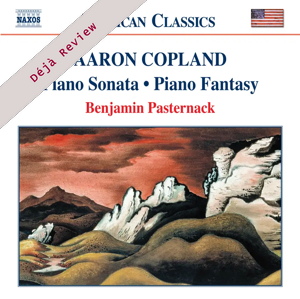
Déjà Review: this review was first published in September 2005 and the recording is still available.
Aaron Copland (1900-1990)
Piano Fantasy (1955-1957)
Piano Sonata (1939-1941)
Piano Variations (1930)
Benjamin Pasternack (piano)
rec. 2003, Toronto Centre for the Arts, Toronto, Canada
Naxos 8.559184 [63]
Copland can hardly be said to have composed for the piano in a large way. If we look at the ‘Complete Piano Works’ on Sony (Classical 66345) recorded by Leo Smit we find a total duration just short of two hours. There are some 17 works recorded. Three of them account for over an hour’s worth of music. The remaining 14 average about three and a bit minutes each.
The upshot of this is that although many of the lesser works are interesting, attractive and perhaps even fun, Copland’s reputation as a composer for piano does tend to rest on the three big ones – and deservedly so.
All three of these key works are recorded on this present disc and allow us to get to the very heart of ‘Copland the Pianist’. The first thing to point out is that these works are extremely difficult to play from both a technical and an interpretive angle – Benjamin Pasternak achieves considerable success on both counts.
As an aside the Sonata has 13 versions currently available: the Variations and Fantasy has 8 and 7 editions respectively.
The Variations is the earliest of the three works on this disc. Apparently Copland used to joke(?) that he emptied rooms with this work in his younger days. It was written after a period of study with Nadia Boulanger when the composer began to experiment with ‘abstract and concentrated forms’ as opposed to the jazz/classical fusion of the 1920s. There is an anecdote about Leonard Bernstein: at his first meeting with Aaron Copland, he sat down at a piano and played the Variations from memory. Apparently it was Lenny’s favourite work in his Harvard days. No doubt Copland was seriously impressed.
This work was, and has been, criticised as being unmusical and difficult and even un-listenable. Yet another group of critics lauded the work as the shape of things to come. So whatever view the audience took, it was a pivotal work when it was introduced to the American musical public in the early 1930s. Now that three-quarters of a century have flown it is probably time for reappraisal. We are no longer offended by the style of composition. We no longer need to take sides on its value and worth. And let’s be honest, it seems quite tame compared to some that we have had to sit thought in the 1960s and 1970s!
The present recording plays down the more ‘granitic’ qualities. In fact Pasternak introduces a considerable sense of lyricism. Current day critics are debating whether this is being true to the original concept or not. My feeling is that the present recording strikes a balance between the austere playing often associated with this work and a more lyrical approach that may bring it to a wider range of listeners.
The Piano Sonata was composed between the Variations and Fantasy. It was commissioned by the playwright Clifford Odets in 1939. Some critics have suggested that this is a tough work to get to grips with. It has been described as being ‘difficult in form and style and unyielding in content’. Yet I feel that although it is not written in a populist style like Billy the Kid it is certainly approachable. It is fair to say that a little effort needs to go into understanding this work. It does not do to play it in the background whilst negotiating the M25 or sipping a Napoleon brandy after a heavy meal. Pasternak provides a dedicated and committed performance and he is able to present it as a work that is fairly straightforward and laid out with considerable clarity. It is actually quite moving with many reflective passages to balance the ‘jazzy’ elements encountered in the middle movement. Look out for the scrap book effect of snippets of American musical styles that infuses much of the argument.
The genesis of the Piano Fantasy was a projected piano concerto for William Kapell. However after the pianist’s death in a plane crash this plan was summarily abandoned. The sketches were kept and subsequently reappeared as a new work for solo piano. The Fantasy is in three movements concluding with a coda. Copland utilises twelve tone compositional techniques based around a ten-note theme. The basic premise is to create a ‘spontaneous and unpremeditated sequence of ‘events’ that would carry the listener irresistibly from the first to the last note.’ This is certainly the most complex and virtuosic work on this CD. However this does not damage its approachability. All the standard Copland fingerprints are present – including jazz rhythms. However anyone hoping for a ‘Hoe Down’ is going to be disappointed. I have referred to this work elsewhere as being ‘rugged’ and that remains a good adjective.
The writer Paul Reale stated, with considerable justification that ‘the Piano Fantasy is, without question the greatest of Copland’s piano works, and one of the grandest conceptions in American Piano music’. Benjamin Pasternak tackles this work with skill, commitment and conviction.
This is an essential work for all listeners interested in American ‘Classical’ music. It contains the three masterworks for piano by one of the greatest American composers. The playing complements the vivacity, complexity and depth of this fine music at all times.
John France
Buying this recording via a link below generates revenue for MWI, which helps the site remain free.



















